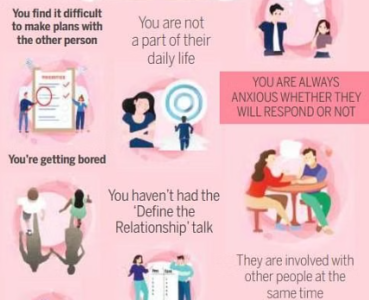The term “situationship” refers to a romantic relationship that lacks clarity and commitment. In a situationship, two people may behave like they’re in a relationship, but they haven’t defined their relationship status or intentions. This can lead to confusion, anxiety, and heartache. If you’re unsure whether you’re in a situationship or not, keep reading for 15 signs you are in a situationship and how to fix it.
How to tell if yours is a “situationship” and not a relationship
Sometimes it can be very difficult telling whether you are in a relationship with someone or not. If you don’t see any serious commitments towards the future of your supposed love affair, then it’s possible that you are in a situationship. Here are some characteristic leads to let you tell a part a relationship from a situationship. We have also discussed some possible fixes for each of the listed pointers:
Quick Read: Signs you are in a situationship.
1. No clear definition of the relationship
In a situationship, there’s often no clear definition of the relationship. You may feel like you’re in a relationship, but you haven’t explicitly discussed your intentions, boundaries, and expectations. This can lead to confusion and anxiety.
How to fix it: Have an honest conversation with your partner about your relationship status, intentions, and boundaries. This can help you both get on the same page and avoid misunderstandings.
Quick Read: Best 80’s fashions for women
2. Clear lack of commitments
Situationships are often characterized by a lack of commitment from either couple. You may feel like you’re in a relationship, but your partner isn’t willing to commit to you. This can make you feel insecure and unsure about your future.
How to fix it: Have an honest conversation with your partner about their willingness to commit. If they’re not willing to commit, you may need to reassess your own priorities and decide if you’re willing to continue the relationship.
3. You are no longer your partner’s priority
Whenever the affair turns into a situationship, priorities tend to shift. You may not be each others priority anymore. Often this can manifest in the form of cancelation of plans or failure to prioritize scheduled dates or meetings. When your supposed lover can’t make time for your, there’s always the temptation to feel somewhat undeserving and unworthy of their love. Such is the experience you have to deal with in a situationship.
How to fix it: Have an honest conversation with your partner about how their behavior is making you feel. If they’re unwilling to make you a priority, you may need to reassess the relationship.
Quick Read: Common fake love quotes
4. No emotional connection or support
Emotional connection and support are very conspicuous in a relationship. However, in situationship, they are neither here nor there. One may often feel emotionally detached from their partner if the affair has degenerated to a situationship. Usually, this may manifest in ways such as the partner not being able to offer support when you genuinely need it. In most cases, they won’t even listen to you, either. Over time, you may begin to feel lonely.
How to fix it: Have an honest conversation with your partner about the importance of emotional support in a relationship. If they’re unwilling or unable to provide emotional support, you may need to reassess the relationship.
5. There’s always a sense of insecurity
If you and your partner are in a situationship, you may feel a sense of insecurity characterized by emotional or physical abuse. The pattern can repeat itself time and time again. It’s important to note that things can only get worse from there on, unless you have a meaningful conversation with your partner to get the problem fixed.
Quick Read: Type of Body shapes for women
How to fix it: Seek help and support if you’re in an abusive relationship. This may include talking to a therapist, seeking legal advice, or reaching out to a support group.
6. No chemistry
Whenever you notice that you no longer share common values or life goals with you partner, then it’s possible that you are caught up in a situationship. When in such a type of complicated relationship, couples tend to lose chemistry and share very few, if any, values and goals. The sooner you fix it with your partner, the better for the both of you.
How to fix it: Have an honest conversation with your partner about your values and goals. If you’re unable to find common ground, you may need to reassess the relationship.
7. No intimacy and little or no affection
When affection and intimacy are have reduced significantly, or gone all together, it’s time you knew you are in a situationship. One of the telltale signs of a situationship is low intimacy and affection. In most cases, your partner won’t even want to try and get it fixed.
How to fix it: Have an honest conversation with your partner about your need for intimacy and affection. If they’re unwilling or unable to provide this, you may need to reassess the relationship.
8. No introduction to family or friends
If one of you is somewhat hesitant to introduce the other to their friends and family, then it is possible that they aren’t serious or may not even be considering starting a lasting relationship with you. Whenever someone isn’t comfortable introducing you to their friends and family, it’s a sign that they aren’t very much interested in a relationship with you. Simply put, you are in a situationship with them.
How to fix it: Have an honest conversation with your partner about your concerns and discuss why you’re hesitant to introduce them to your friends and family. If they’re unwilling to address your concerns, you may need to reassess the relationship.
9. There’s no progress or growth in the relationship
If you and your partner both seem unsure of the future of the relationship, you might start having feelings of stagnation. Such an engagement isn’t growing and is bound to fail, unless fixed. Don’t allow yourself to be left in a state of limbo, especially when it come to the future of the relationship. It’s better to have an idea of whether the relationship is growing or destined to end at a very early stage in the engagement.
How to fix it: Have an honest conversation with your partner about your future together. If you’re unable to come to a clear agreement, you may need to reassess the relationship.
10. Feeling miserable and unhappy
When the relationship feels boring, you will most likely feel miserable and unfulfilled. These are cardinal indicators of the engagement degenerating into a situationship. When you get to that point, its time to try and understand your partner’s opinion on how to get the relationship away from the situationship path into something more promising and futuristic.
How to fix it: Have an honest conversation with your partner about your feelings. If you’re unable to find a way to improve the relationship, you may need to consider ending it.
11. Little or no communication
Situationships are often characterized by diminished communication. If there’s little or no communication between you and your partner, then it’s just a matter of time before the ailing engagement fails completely. Unless, either partners isn’t interested, you may take steps to salvage the relationship.
Quick Read: Dragon tattoo design ideas
How to fix it: Make an effort to improve communication with your partner. This may include setting aside time to talk, being open and honest about your feelings, and actively listening to your partner.
12. Infidelity or suspicion there of
In a situationship, because of little or no communication, there comes a point in the relationship when you start suspecting your partner of having affairs with other people. Of course, when such insecurities set in, the engagement is hurtling toward its tail end. An immediate fix is in order, if you wish salvage the engagement.
How to fix it: Have an honest conversation with your partner about your concerns. If they’re unwilling to be transparent about their dating habits, you may need to reassess the relationship.
13. You feel used and overburdened
Situationships may be one sided at some point. When it gets there, you might feel like you are doing a lot for the engagement while the partner is doing very little. Common instances that exemplify this include when a partner only reached out when they want something from you.
How to fix it: Have an honest conversation with your partner about how their behavior is making you feel. If they’re unwilling to change, you may need to reassess the relationship.
14. Fakeness and inauthenticity
A meaningful relationship is one where there’s freedom to be yourself at all times. Whenever you or your partner starts acting, being fake, and inauthentic, you can be sure things are tending towards a situationship. You need to have a meaningful conversation around how to get things back on track.
How to fix it: Have an honest conversation with your partner about your need to be yourself. If they’re unwilling to accept you for who you are, you may need to reassess the relationship.
15. No exclusivity
When the relationship degenerates into a situationship, trust issues and suspicion begins to take center stage in the engagement. Either partner may feeling that exclusivity is lacking or altogether lost. When that happens, the end of the engagement is too close.
How to fix it: Have an honest conversation with your partner about your expectations for exclusivity. If you’re unable to come to a clear agreement, you may need to reassess the relationship.
Conclusion
Being in a situationship can be confusing and frustrating. However, it’s possible to fix the situation and create a healthy, fulfilling relationship. By identifying the signs of a situationship and taking steps to improve the relationship, you can move towards a more fulfilling, committed partnership. Remember to communicate openly and honestly with your partner, set clear boundaries and expectations, and prioritize your own emotional and physical well-being. With time and effort, you can create the healthy, loving relationship you deserve.



























